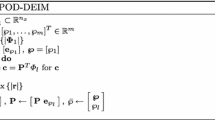Abstract
The oil recovery enhancement is a major technical issue in the development of oil and gas fields. The smart oil field is an effective way to deal with the issue. It can achieve the maximum profits in the oil production at a minimum cost, and represents the future direction of oil fields. This paper discusses the core of the smart field theory, mainly the real-time optimization method of the injection-production rate of water-oil wells in a complex oil-gas filtration system. Computing speed is considered as the primary prerequisite because this research depends very much on reservoir numerical simulations and each simulation may take several hours or even days. An adjoint gradient method of the maximum theory is chosen for the solution of the optimal control variables. Conventional solving method of the maximum principle requires two solutions of time series: the forward reservoir simulation and the backward adjoint gradient calculation. In this paper, the two processes are combined together and a fully implicit reservoir simulator is developed. The matrixes of the adjoint equation are directly obtained from the fully implicit reservoir simulation, which accelerates the optimization solution and enhances the efficiency of the solving model. Meanwhile, a gradient projection algorithm combined with the maximum theory is used to constrain the parameters in the oil field development, which make it possible for the method to be applied to the water flooding optimization in a real oil field. The above theory is tested in several reservoir cases and it is shown that a better development effect of the oil field can be achieved.
Similar content being viewed by others
References
BROUWER D. R. Dynamic water flood optimization with smart wells using optimal control theory[D]. Delft, The Netherlands: Delft University of Technology, 2004.
WANG C. H., LI G. M. and REYNOLDS A. C. Production optimization in closed-loop reservoir management[C]. SPE Annual Technical Conference and Exhibition, 109805. Anaheim, California, USA, 2007.
JANSEN J. D., DOUMA S. D. and BROUWER D. R. et al. Closed-loop reservoir management[C]. SPE Reservoir Simulation Symposium, 119098. The Woodlands, Texas, USA, 2009.
ZHANG Kai, LI Yang and YAO Jun et al. Theoretical research on production optimization of oil reservoirs[J]. Acta Petrolei Sinica, 2010, 31(1): 78–83(in Chinese).
CHEN C. H., LI G. M. and REYNOLDS A. C. Robust constrained optimization of short- and long-term net present value for closed-loop reservoir management[J]. SPE Journal, 2010, 17(3): 849–864.
ZHANG K., LI G. M. and REYNOLDS A. C. et al. Optimal well placement using an adjoint gradient[J]. Journal of Petroleum Science and Engineering, 2010, 73(3–4): 220–226.
JANSEN J. D. Adjoint-based optimization of multiphase flow through porous media—A review[J]. Computers and Fluids, 2011, 46(1): 40–51.
ALGHAREEB Z. M., HORNE R. N. and YUEN B. B. et al. Proactive optimization of oil recovery in multilateral wells using real time production data[C]. SPE Annual Technical Conference and Exhibition, 124999-MS. New Orleans, Louisiana, USA, 2009.
CHEN S. N., LI H. and YANG D. Y. Production optimization and uncertainty assessment in a CO2 flooding reservoir[C]. SPE Production and Operations Symposium, 120642-MS. Oklahoma City, Oklahoma, USA, 2009.
LORENTZEN R. J., BERG A. M. and NAEVDAL G. et al. A new approach for dynamic optimization of waterflooding problems[C]. Intelligent Energy Conference and Exhibition. Amsterdam, The Netherlands, 2006.
CHAUDHRI M. M., PHALE H. A. and LIU N. An improved approach for ensemble based production optimization: Application to a field case[C]. EUROPEC/EAGE Conference and Exhibition, 121307. Amsterdam, The Netherlands. 2009.
CHEN Y., OLIVER D. S. Localization of ensemblebased control-setting updates for production optimization[J]. SPE Journal, 2012, 17(1): 122–136.
SHUAI Y. Y., WHITE C. D. and ZHANG H. C. Using multiscale regularization to obtain realistic optimal control strategies[C]. SPE Reservoir Simulation Symposium, 142043. The Woodlands, Texas, USA, 2011.
CHEN C. H., JIN L. and GAO G. H. et al. Assisted history matching using three derivative-free optimization algorithms[C]. SPE Europec/EAGE Annual Conference, 154112. Copenhagen, Denmark, 2012.
ZHAO H., CHEN C. H. and DO S. et al. Maximization of a dynamic quadratic interpolation model for production optimization[J]. SPE Journal, 2013, 18(6): 1012–1025.
YAN X., REYNOLDS A. C. An optimization algorithm based on combining finite-difference approximations and stochastic gradients[C]. SPE Reservoir Simulation Symposium, 163613. The Woodlands, Texas, USA, 2013.
SARMA P., CHEN W. H. and DURLOFSKY L. J. et al. Production optimization with adjoint models under nonlinear control-state path inequality constraints[J]. SPE Reservoir Evaluation and Engineering, 2008, 11(2): 326–339.
AZIZ S. O. Comparison of solutions to a three dimensional black-oil reservoir simulation problem[J]. Journal of Petroleum Technology, 1981, 33(1): 13–25.
Author information
Authors and Affiliations
Corresponding author
Additional information
Project supported by the China Important National Science and Technology Specific Projects (Grant No. 2011ZX05024-002-008), the Fundamental Research Funds for the Central Universities (Grant No. 13CX02053A) and the Changjiang Scholars and Innovative Reserch Team in University (Grant No. IRT1294).
Biography: ZHANG Kai (1980-), Male, Ph. D., Associate Professor
Rights and permissions
About this article
Cite this article
Zhang, K., Zhang, Lm., Yao, J. et al. Water flooding optimization with adjoint model under control constraints. J Hydrodyn 26, 75–85 (2014). https://doi.org/10.1016/S1001-6058(14)60009-3
Received:
Revised:
Published:
Issue Date:
DOI: https://doi.org/10.1016/S1001-6058(14)60009-3



